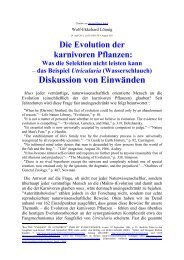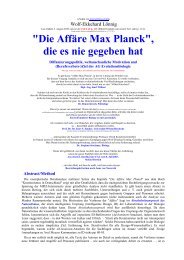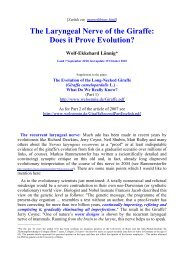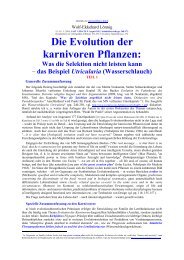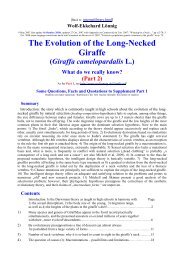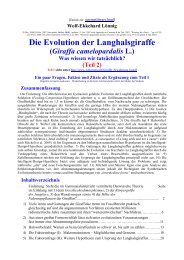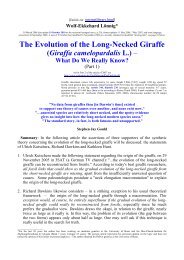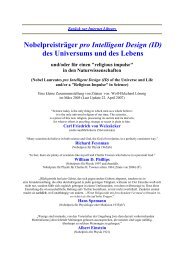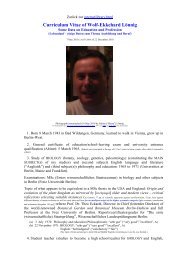Die Affäre Max Planck - Wolf-Ekkehard Lönnig
Die Affäre Max Planck - Wolf-Ekkehard Lönnig
Die Affäre Max Planck - Wolf-Ekkehard Lönnig
Erfolgreiche ePaper selbst erstellen
Machen Sie aus Ihren PDF Publikationen ein blätterbares Flipbook mit unserer einzigartigen Google optimierten e-Paper Software.
57<br />
SPEMANN-Zitat hingewiesen - streng und missbilligend: "Portmann, diesen Satz hätte Spemann nicht schreiben<br />
dürfen!"" Siehe weitere Punkte zu Spemann unter http://www.weloennig.de/Nobelpreistraeger.pdf.<br />
Sir John Eccles (siehe zum Beispiel: http://nobelprize.org/nobel_prizes/medicine/laureates/1963/eccles-bio.html)<br />
(Nobelpreis für Physiologie oder Medizin zusammen mit A. Hodkin und A. Huxley<br />
1963 "for their discoveries concerning the ionic mechanisms involved in excitation<br />
and inhibition in the peripheral and central portions of the nerve cell membrane")<br />
hat in seinen wissenschaftlichen Arbeiten immaterielle Theorien vertreten, was<br />
ihm entsprechend die ständige Kritik materialistischer Philosophen (bis heute)<br />
einbrachte, zum Beispiel in diesem Beitrag:<br />
"Eccles lehnte einen strikten Materialismus, also die Position, das Bewusstsein lasse sich auf rein physikalische<br />
und chemische Prozesse zurückführen, ab. Er verglich etwa das Gehirn mit einem Computer und das "Ich" mit<br />
dessen Programmierer. Seine Vorstellung von der Interaktion zwischen Gehirn und immateriellem Bewusstsein<br />
stellte Eccles in den 1970er Jahren zusammen mit dem Philosophen Karl Popper in dem Buch The Self and its<br />
Brain vor (deutsch: Das Ich und sein Gehirn) (siehe http://de.wikipedia.org/wiki/John_Carew_Eccles).<br />
Hier sei zunächst an einige seiner Bemerkungen aus http://www.weloennig.de/Nobelpreistraeger.pdf<br />
erinnert.<br />
(a) "If you do not believe in purpose and design, then you can argue that this is just chance and necessity. But it<br />
is silly to be caught with chance and necessity for your existence. ...They [the 'naturalists', i.e. the adherents of the<br />
synthetic theory of evolution] need a little more humility. They need the humility to think that we are all in this<br />
together – all life and, of course, all human beings, and that they are part of the great creation plan."<br />
(b) "[I]f you look at the whole evolutionary process from the Big Bang onwards – the evolution of the cosmos<br />
and the evolution of biological life – I have a feeling that it all seems to make sense. It was as if there was a<br />
purpose in it all with...some kind of purposive goal in the whole creative process. And this leads to the incredible<br />
creation of each of us as human selves along with the whole biological side of us.<br />
...So how does this relate to the Big Bang? Well, there seems to be some purpose, some deeper meaning to it all.<br />
There must be a divine plan - the Anthropic Principle. This divine plan came through this whole immense cosmos."<br />
(c) "But the conscious self is not in the Darwinian evolutionary process at all. I think it is a divine creation."<br />
"And this [the conscious self] is a creation, a loving creation...This is a loving Creator giving us all these wonderful<br />
gifts."<br />
Siehe die Literaturangaben und auch weiteren Ausführungen unter http://www.weloennig.de/Nobelpreistraeger.pdf<br />
In seinem Buch The Human Psyche (ebenfalls im wissenschaftlichen Springer-<br />
Verlag, 1980) bemerkt er unter anderem (p. 252). :<br />
"…I myself have also the strong belief that we have to be open to the future. This whole cosmos is not<br />
just running on and running down for no meaning. In the context of Natural Theology I come to the belief that<br />
we are creatures with some supernatural meaning that is as yet ill defined. We cannot think more than that we<br />
are all part of some great design, which was the theme of my first Gifford series (Eccles, 1979 a). Each of<br />
us can have the belief of acting in some unimaginable supernatural drama.”<br />
'Aber keine einzige wissenschaftliche Theorie nimmt auf übernatürliche, immaterielle oder<br />
teleologische Faktoren Bezug.'<br />
Joachim Illies (bis 1982 Direktor am <strong>Max</strong>-<strong>Planck</strong>-Institut für Limnologie, Plön<br />
und Professor für Zoologie an der Universität Gießen): Siehe sein Buch zum<br />
Darwinismus und der Synthetischen Evolutionstheorie Der Jahrhundert-Irrtum<br />
mit dem Untertitel Würdigung und Kritik des Darwinismus. Umschau Verlag<br />
1983, Frankfurt am Main.<br />
Hier nur ein paar Andeutungen (p. 88): "<strong>Die</strong> Sinnfrage ist also auch in der<br />
Biologie wieder zu stellen, ja sie sollte die eigentliche Krönung biologischer<br />
Forschung sein" (von Illies kursiv). Und pp. 82/83:



